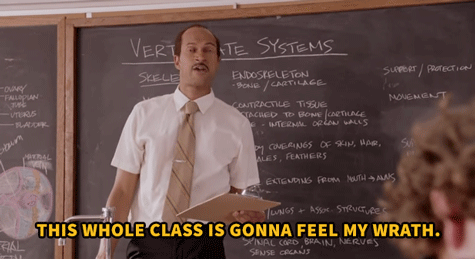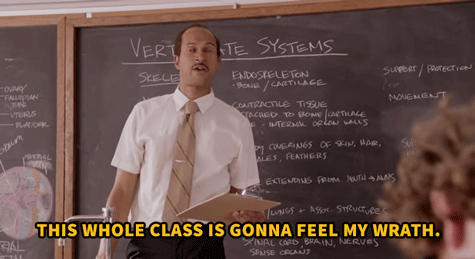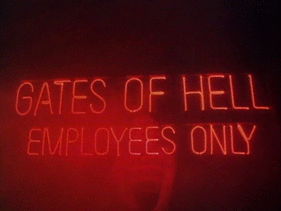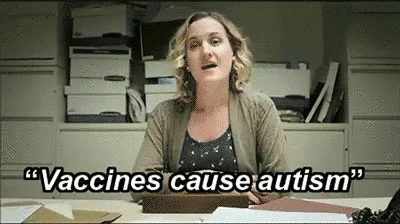The two kinds of professors you’ll meet

When I was in college, there was this one chemistry professor known for being very tough on students. He was the professor you’ve probably heard about, the one who tells the class that most of them will fail and will have to re-take the course. He said that it was pointless to try and get outside help for his class (Organic Chemistry) because he tested us on what he instructed and how he instructed it. In his mind, it seems, there was only one true way to learn.

I failed the class miserably. The dude had no time for us to meet with him to ask follow-up questions to the things he was teaching us. Many of his classes were riddled with diatribes about the current state of affairs in the world. (This was the 90s, and he was angry at Bill Clinton’s extramarital affairs.) Seriously, he would stop in the middle of explaining a chemical reaction step to tell us how he felt about a stained dress.
In order to make up for failing his class, I had to retake Organic Chemistry I and II over the summer… At the same time!

Not a problem!
It wasn’t until I was in graduate school that I became more aware of the kinds of people who had become professors in institutions of higher learning. There were the good ones and the not-so-good ones, and I think I’ve managed to split them into two distinct groups. See if you agree with me.
Group #1 are the professors who say things like these:
“Hello, child. I know you want to get into the club that I belong to, but it’s a very exclusive club. You better bring your A-game because I will make it very hard for you to get in. You better do as I say or I will make sure that you never get in. By the way, here’s some data of mine that I want you to run through a black box and come up with some numbers. Bring me those numbers, but let me do the explaining of why we’re seeing those numbers. Also, I am writing a pretty big paper about those numbers that will likely be published. No, you will not be listed as an author. You’re not in the club yet. Instead, you will be in the acknowledgements, and that’s only if I am happy with your work. If you let other aspects of your life get in the way, or you mistreat my data, you might as well just go look for someone else to guide you on your professional path because I won’t have any of it. Also, here are five grant applications due this Friday. If we don’t get all five of them, I won’t have any money to pay you for your work. So get ready to work late nights and maybe even go without food for a while. Do all that, and then some, and I’ll think about letting you into the club.”
Group #2 are the professors who say things like these:
“Hi, Ren. Glad you could join us at this fine institution. Listen, a lot of people went through a lot of trouble to ask people for information about their private lives and medical history. So the data extracted from those interviews is very sensitive and belongs to the people it was collected from. Be very careful with it because we hope to get some good information out of it that will benefit those people. Don’t just run it through a black box and bring me the numbers. Please do a literature review to see where the gaps in knowledge are and then see how the data applies to those gaps and how it can best serve to plug those gaps. We will have weekly meetings with the rest of the team where you will give us input on what you’ve found and we will give you constructive criticism on how to move forward. In the end, we hope to have a good piece of literature that answers some good questions. Then we’ll work hard on getting the right people to listen to those answers so that the people whose data we used, the people who collected the data, and you and the rest of the team all benefit from policies and interventions based on our findings. For that, you get to be co-author and even present the findings at conferences or to the media. As for pay, we will work together — the whole team — to get some grants, scholarships, and other help to keep you comfortable while you do this work and while you move into working on your own dissertation. If you fall behind, let me and the rest of the team know. We’ll figure out a way to help you, just like I’m sure you’ll find ways to help us. Look, we’re a club, and some would say a very exclusive one, but we’re only exclusive in that we want people who can contribute to the rest of humanity into the club. People in it only for themselves, or for fame and glory, need not apply.”
At least that’s how I’ve seen professors in Public Health. There are those who are hyper-obsessed about grants and recognition, and then there are those who are diligent about their findings doing the most good for the most people. It’s like the automobile engineer who focuses on a car that is efficient, ergonomic, and safe… Compared to the engineer who focuses on the looks of the car and how much they can hike up the price.

Let me know when a Lamborghini can help you park like this.
Now, tell me, which professor is most likely to allow innovation in their group? I don’t know about you, but innovation is a big deal for me. I need things to be better, and I love finding out better ways to do things. I have zero respect for the status quo. (Yeah, okay, I have some respect for the status quo, but not a lot.) And I am always looking for better ways to use what we have for what needs to be done.
My personal hell is an office building full of cubicles where all I do each day is the same thing I did the day before.

Look, I get it. I understand that the world of academia is feeling the crunch right now from cuts in funding to research grants. I understand that there is a surplus in the number of students who want to do research, so they’re all fighting for position and pretty much willing to do just about anything to get ahead.

And I do mean anything.
But I’m not. There is a limit to what I am willing to do and what I’m willing to spend my abilities on. I’m also in public health not for myself. I never was in it for myself. I’m in it, truly, to help the public. Let to our own devices, humans will wipe ourselves out in a matter of generations. We need all the help we can get to live healthier lives because the level of mistrust in science and misunderstanding of how the world works is at an all-time high.
Without us in public health, think of the damage that the Jenny McCarthys of the world could do.

Now, imagine if all we did was collect data on who was vaccinated and who was not, who had autism and who did not, and came up with some study about vaccines and autism. Would the findings alone be enough to dissuade the people who continue to say that vaccines cause autism? Probably not for the great majority of them. The great majority require us to put those findings in context, to tell the stories that need to be told, to get up in front of audiences and relay the information in a way that is understood.
Getting caught up in writing a grant application for the next autism-vaccine study might get in the way of settling the matter. Not to mention that… Well…

It’s settled, okay?
So what to do about this? How do we start changing the culture that leads to the first kind of professors? Well, that’s for a whole other post at some other time. For now, thanks for reading.
Your observations are spot on about the two types of professors that graduate, and even undergraduate, students encounter at university. One obstructs your entry into the club, the other helps you understand the demands of the culture and enterprise, and decide if entry is the right decision for you.
I’ll never forget an interview with a department head at Emory University who asked me, “If I had permission to go for a PhD.”
I replied, “Perhaps you intended to ask if I have support from family and friends? If you read my file, you would have noted that I am single, even if I were married, I still would not need permission from from anyone.”
Needless to say, I did not go for my PhD.
LikeLike
Yes, I’ve heard plenty of stories about women in my program being asked about their plans for a family during their studies, and then they’re warned of the perils of trying to have a family and complete a doctorate.
LikeLike